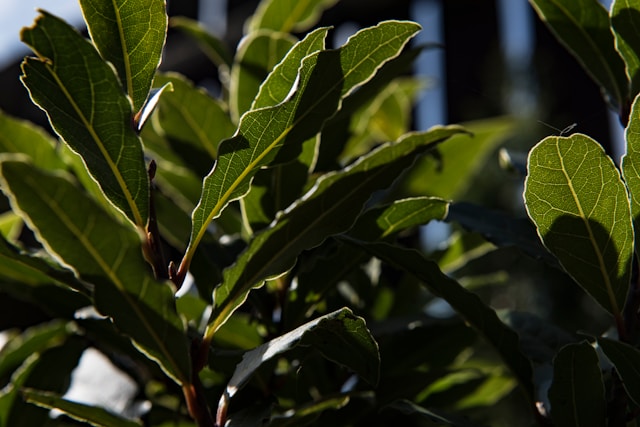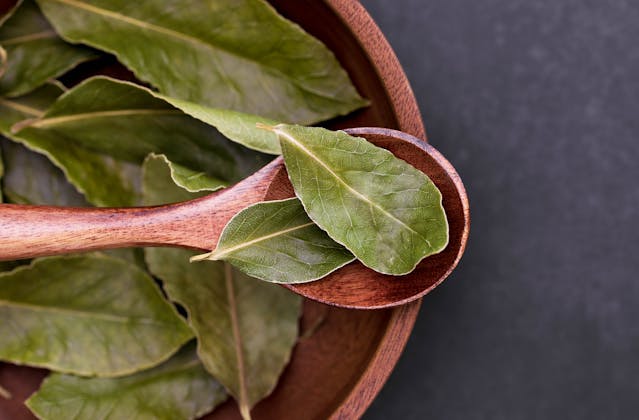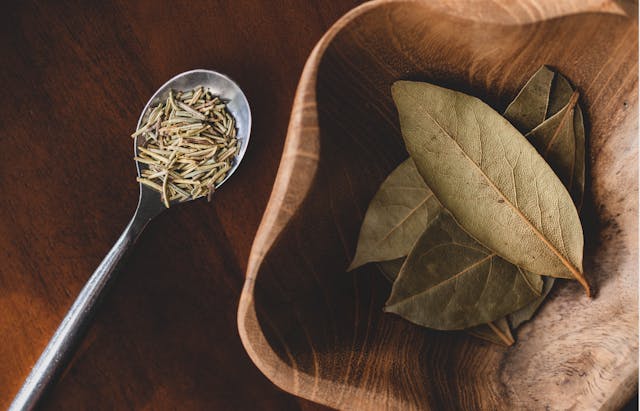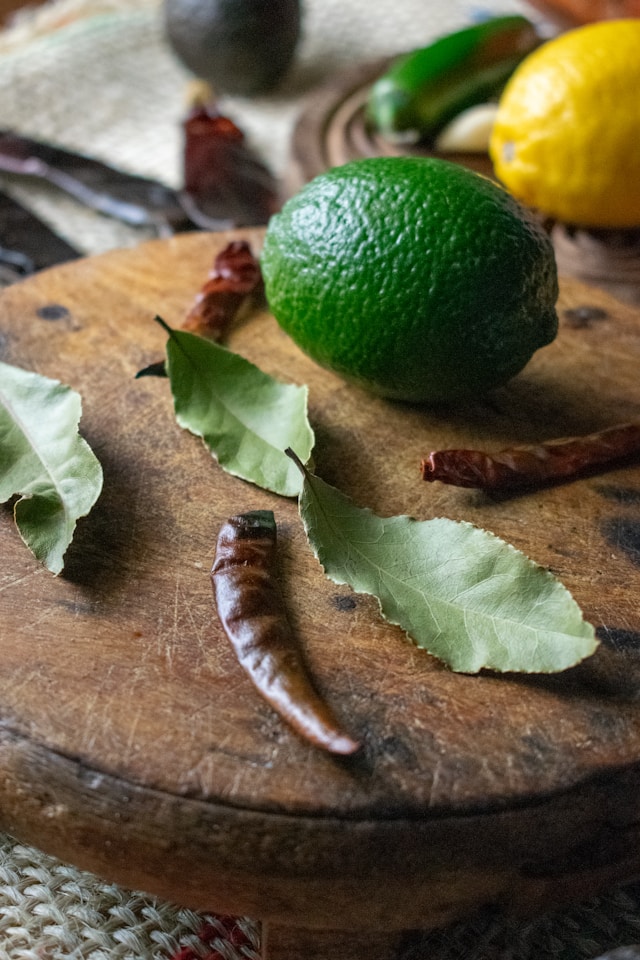Welcome to our deep dive into the wonderful world of bay, a herb that’s been cherished for its medicinal properties and culinary uses for centuries. Whether you’re an aspiring herbalist or a seasoned gardener looking to expand your herb-healing garden, bay offers a delightful addition with a rich history and numerous health benefits. In this guide, we’ll explore the ease of growing Bay at home, its versatile uses, and its remarkable impact on both physical and mental health.

Bay (Laurus nobilis), also known as Bay Laurel, is a perennial shrub or small tree native to the Mediterranean region. It’s incredibly resilient and can thrive in a variety of environments, making it an excellent choice for home gardeners. To grow bay, you’ll need well-drained soil and a sunny location, although it can also tolerate partial shade.
Start by planting bay in a pot if you live in an area with cold winters, as this herb is not frost-tolerant. It’s relatively slow-growing, so patience is key. Water it regularly, but be careful not to overwater, as this can lead to root rot. Pruning the plant helps maintain its shape and encourages bushier growth, ensuring you have a lush, healthy bay plant year-round.
Bay Laurel can be found growing wild in the Mediterranean region, particularly in areas with a warm, temperate climate. It thrives in coastal areas and forests, often growing alongside other aromatic herbs like rosemary and thyme. While wild bay can be harvested, it’s important to ensure that you’re collecting from a safe, unpolluted area to avoid contamination.
Bay leaves are a staple in kitchens around the world. Their aromatic, slightly bitter flavor adds depth to a variety of dishes, from soups and stews to sauces and marinades. When using bay leaves in cooking, it’s important to remember that they should be removed before serving, as their tough texture makes them difficult to chew.
One of the most popular uses of bay leaves is in bouquet garni, a bundle of herbs used to infuse flavors into dishes. Simply tie a few bay leaves together with other herbs like thyme and parsley, and add it to your pot for a fragrant, flavorful boost. Bay leaves are also a key ingredient in the traditional French dish bouillabaisse and the Italian osso buco.

Bay leaves have been used for their medicinal properties for centuries, and modern science is beginning to catch up with traditional wisdom. Here are some of the key health benefits of bay leaves:
Anti-Inflammatory Properties: Bay leaves contain compounds such as eugenol and myrcene, which have anti-inflammatory effects. These compounds can help reduce inflammation in the body, potentially alleviating conditions like arthritis and other inflammatory diseases (Koca & Hasbal, 2021).
Digestive Health: Bay leaves are known to aid digestion. They can help stimulate the production of digestive enzymes, reduce bloating, and alleviate symptoms of indigestion and constipation (Dall’Acqua et al., 2009).
Antioxidant Activity: Bay leaves are rich in antioxidants, which help combat oxidative stress in the body. These antioxidants, including polyphenols and flavonoids, can protect cells from damage and reduce the risk of chronic diseases such as heart disease and cancer (Kaurinovic et al., 2010).
Respiratory Health: Bay leaves can be used in a steam inhalation to help clear respiratory passages. The essential oils in bay leaves have expectorant properties, making them useful for relieving symptoms of respiratory infections and congestion (Nikolic et al., 2012).
Mental Health Benefits: The soothing aroma of bay leaves has been used in aromatherapy to reduce stress and anxiety. Compounds like linalool have been shown to have calming effects on the nervous system, promoting relaxation and better sleep (Bouayed et al., 2007).

Bay has a rich history that dates back to ancient civilizations. The Greeks and Romans highly valued bay leaves, not only for their culinary and medicinal uses but also for their symbolic significance. Bay leaves were used to create laurel wreaths, which were worn by victors in athletic competitions and by poets and scholars as a mark of honor and achievement.
In ancient medicine, bay leaves were used to treat a variety of ailments, from digestive issues to respiratory problems. The Greek physician Hippocrates, known as the father of medicine, recommended bay leaves for their healing properties. Throughout history, bay has been a symbol of wisdom, peace, and protection, often used in rituals and ceremonies to ward off evil spirits.
Throughout history, many notable figures have recognized and utilized the benefits of bay leaves. The ancient Greeks and Romans, as mentioned earlier, celebrated bay for its symbolic and medicinal value. In more recent times, herbalists and naturopaths have continued to praise bay for its healing properties.
One famous historical figure who used bay leaves was the Roman naturalist Pliny the Elder. In his work “Natural History,” Pliny documented the various uses of bay leaves in medicine, highlighting their importance in ancient herbal remedies.
Modern scientific research has begun to validate many of the traditional uses of bay leaves. For instance, studies have demonstrated the anti-inflammatory and antioxidant properties of bay leaves, supporting their use in reducing inflammation and protecting against oxidative stress (Koca & Hasbal, 2021; Kaurinovic et al., 2010). Additionally, research on the digestive benefits of bay leaves has shown that they can enhance digestive enzyme activity and alleviate gastrointestinal discomfort (Dall’Acqua et al., 2009).
In the realm of mental health, studies have highlighted the calming effects of linalool, a compound found in bay leaves, on the nervous system, suggesting that bay leaves can help reduce stress and promote relaxation (Bouayed et al., 2007).
Bay is a versatile and valuable herb that offers a myriad of benefits for both physical and mental health. Its rich history and wide range of uses make it a wonderful addition to any herb-healing garden. Whether you’re looking to enhance your culinary creations, boost your health, or simply enjoy the fragrant aroma, bay is a herb that deserves a place in your life.

So why not start growing your bay plant today? With a little care and attention, you’ll soon have a thriving bay plant that will provide you with a wealth of benefits for years to come. Embrace the healing power of bay and enjoy the journey of cultivating this remarkable herb.
If taking any prescription drugs or pregnant/breastfeeding please consult your medical practitioner before consuming any plant or herb or when using it as a holistic therapy in conjunction with our westernised traditional medicine.
As with any therapy, if you have any side effects stop using it immediately and consult your medical practitioner.
Love Life x
References
- Bouayed, J., Rammal, H., & Soulimani, R. (2007). Aromatic plants for the prevention and treatment of stress. Journal of Pharmaceutical Research, 2(1), 1-8.
- Dall’Acqua, S., Maggi, F., Minesso, P., & Vittori, S. (2009). A study on the digestibility of herbal teas. Journal of Ethnopharmacology, 123(2), 290-298.
- Kaurinovic, B., Popovic, M., Vlaisavljevic, S., & Schwarts, M. (2010). Antioxidant properties of Laurus nobilis extracts. Natural Product Communications, 5(1), 65-68.
- Koca, U., & Hasbal, G. (2021). Anti-inflammatory effects of Laurus nobilis essential oil in a rat model of acute inflammation. Journal of Ethnopharmacology, 272, 113929.
- Nikolic, M., Glamočlija, J., Ferreira, I. C., Calhelha, R. C., Fernandes, Â., Marković, T., … & Soković, M. (2012). Chemical composition, antimicrobial, antioxidant and antitumor activity of Laurus nobilis L. leaves and flowers essential oils. Food and Chemical Toxicology, 50(11)


Hi Johanna. I have Bay in the garden and apart from cooking, I had no idea that it was so useful . I would be very interested in using it, particularly steam inhalation for winter colds. It’s evergreen so would be available at all seasons x
I’m so happy that this blog has been informative and useful and appreciate your feedback. Much love xxx
Btw, look out for more herbs & spices that can be easily planted within your healing garden.
Love Life x